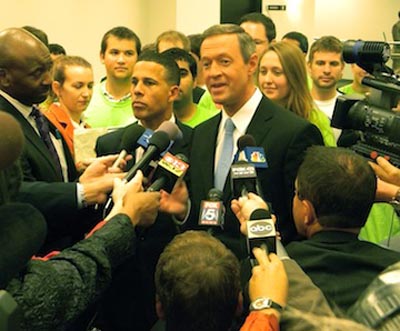Second Debate Gets Heated Between O'Malley and Ehrlich
Capital News Service
Thursday, Oct. 14, 2010
![]()
WASHINGTON - In a debate markedly more hostile than Monday's, the two men vying to become Maryland's next governor on Thursday traded punches on issues as far-ranging as the state pension system, Baltimore schools, gay marriage and immigration.
Democratic Gov. Martin O'Malley and former Republican Gov. Bob Ehrlich, who clearly still don't like each other, stuck to well-worn talking points, presenting few new ideas between jabs at each other's records, before a boisterous audience in the election's second televised debate held at the Washington Post.
One of those new ideas was Ehrlich's proposed change to the public employees' pension system. The former governor, who appeared more aggressive and eager than in Monday's debate, said the state must follow the private sector's move from a defined benefit model toward a defined contribution model and 401Ks for new hires.
O'Malley, sounding polished if cool, said he has created a commission to study the issue and is awaiting its findings, which will include a menu of options that could preserve the pension system.
Neither candidate, however, offered a solution for funding existing pension obligations.
Ehrlich's straight answer on pensions may not have been the game-changer he needed to rally a campaign that's sliding in the polls, but his more professional and focused performance Thursday may help halt the slide, said Todd Eberly, interim director of the Center for the Study of Democracy at St. Mary's College of Maryland.
"What I saw today was a Bob Ehrlich I had never seen in a debate," said Eberly, who handed the win in Thursday's debate to the former governor.
Ehrlich also took the more compelling stance on immigration, Eberly said. Ehrlich said he welcomes legal immigration but noted the negative consequences of illegal immigration on jobs and the economy. O'Malley, who said he supports a pathway to citizenship, speaks to his voter base when he focuses on the state's need to be compassionate.
"Highlighting the effects of illegal immigration on the economy is a stronger message, given the dynamics of this election cycle," Eberly said. "The compassion argument may not carry the day."
But economic issues might.
Ehrlich gave a "blanket no" to new taxes -- "$32 billion budget. You do not raise taxes." Lowering the sales tax, like Ehrlich wants to do, will not create the budget deficit some are predicting, he said, because lower taxes mean people spend more.
O'Malley fired back that Ehrlich "has no idea" how he would make up the revenue lost by a lower sales tax. He said Ehrlich also promised no new taxes in his 2002 campaign and then raised fees, like the flush tax on homes with septic systems. O'Malley's campaign asserts fees are the same as taxes.
The sharpest debate may have come over Ehrlich's accusations that O'Malley is leveraging race issues -- "playing the race card" -- against Ehrlich. The two have slung plenty of mud over an incident of bussing homeless men from Philadelphia to hand out misleading literature favoring Ehrlich at polling places and over the "coded language" O'Malley says Ehrlich uses in reference to mostly African-American schoolchildren in Baltimore.
Gov. Martin O'Malley and former Gov. Robert Ehrlich at the second gubernatorial debate.
(Video by CNS-TV's Alex Ludka)
Ehrlich threw this last argument back at O'Malley, saying the governor raised the sales tax, which is regressive and hurts the poor most.
"Of course he was playing the race card," Eberly said of O'Malley. "They're trying to motivate African-Americans to turn out in the numbers they did in 2008."
The candidates also addressed issues affecting nearby Montgomery and Prince George's counties. O'Malley said moving forward with the Purple Line project as a light rail connecting Bethesda and New Carrollton would benefit both counties, and he wants to create a world-class hospital at Prince George's Hospital Center.
Ehrlich, saying "we have mass transit broken in Maryland," said he supports the Purple Line as a rapid bus system, which is less expensive to build.
In the rapid-fire portion of the debate, moderators brought up one of the seldom-mentioned issues of the campaign: gay marriage.
Before Washington Post Live editor Mary Jordan finished asking her question, Ehrlich answered with a firm "no." He is opposed to allowing or recognizing homosexual marriages.
O'Malley, in a more elaborate response, said he supports the opinion issued earlier this year by Attorney General Doug Gansler, who said Maryland should recognize same-sex marriages performed in other jurisdictions.
This was Ehrlich's weakest moment, Eberly said.
"Gay marriage is a very serious issue," Eberly said. "He needed to let the question be asked and then he could've given a response. He almost seemed dismissive."
O'Malley, in contrast, considered the question and defended Gansler, Eberly said, but he can't say he has provided strong leadership on the issue or pushed the General Assembly to consider a bill that would allow the state to recognize gay marriage.
And of course, both want the Washington Redskins to stay in Maryland rather than returning to the District.




